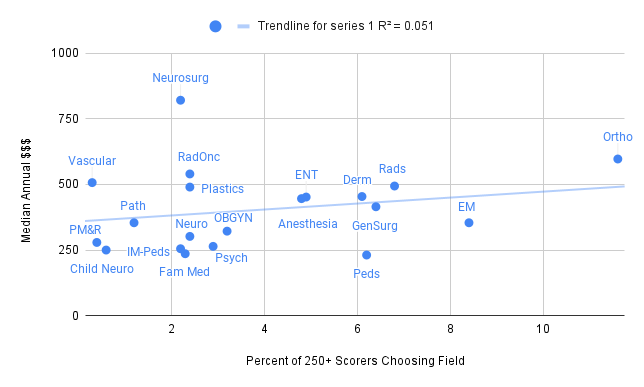- Joined
- Oct 30, 2019
- Messages
- 126
- Reaction score
- 87
Title sums it up. Urology matched 65% last year. I'm looking at the optho and the uro match threads on reddit and I am hearing about these amazing applicants not getting in because they got unlucky. Whether or not these people are lying or not I don't know. I know I don't have the full story. However, it's still a very scary thought.
For me, I'm interested in ortho but there's a 80% match rate. I also attend a T15 but last year out of the 4 that applied, only 2 matched. I know one of the two who didn't match and he was an average applicant according to nrmp statistics. I find the prospect of not being able to get a job after working so hard to get into medical school really scary. Especially with the loans I have accrued.
Currently, I have 6 ortho projects that have been written up and submitted to journals and conferences. None of them have been published yet. One of them was accepted to a conference but I won't be presenting since I am second author.
I have 2 issues/questions.
1. I never feel like I have enough. Like do I have enough research to get into ortho? Do I need more? I feel like it's so competitive to get in that I feel like I always need more. I feel that since STEP 1 is P/F for me, I keep feeling inadequate and wondering how many more publications other people have. Do I need more? Do I need a research year?
2. I keep thinking about other less competitive specialties. Specifically anesthesiology and internal medicine. More anesthesiology right now. I really like that there's still a procedural aspect to it (intubation + putting in lines). I like that the lifestyle is good as well. Also, I talked to people in my school's anesthesiology department and how everyone who applies anesthesia at my school matches and get one of their top 3 choices mostly and how I won't need to do more research if I didn't want to and that is such a major relief. I am not a big fan of research and I like the idea of applying into a specialty with a pretty safe match rate. However, do I really want to give up my aspiration of becoming an ortho surgeon for a "safer career". I keep wondering if I will regret it down the road and ask myself "what if I did try". Or what if my ego gets bruised as I work with other surgeons and keep wondering "Man, I could've been a surgeon". I have heard that no anesthesiologist has ever wished to be a surgeon and surgical residents have switched to becoming anesthesiologists.
For me, I'm interested in ortho but there's a 80% match rate. I also attend a T15 but last year out of the 4 that applied, only 2 matched. I know one of the two who didn't match and he was an average applicant according to nrmp statistics. I find the prospect of not being able to get a job after working so hard to get into medical school really scary. Especially with the loans I have accrued.
Currently, I have 6 ortho projects that have been written up and submitted to journals and conferences. None of them have been published yet. One of them was accepted to a conference but I won't be presenting since I am second author.
I have 2 issues/questions.
1. I never feel like I have enough. Like do I have enough research to get into ortho? Do I need more? I feel like it's so competitive to get in that I feel like I always need more. I feel that since STEP 1 is P/F for me, I keep feeling inadequate and wondering how many more publications other people have. Do I need more? Do I need a research year?
2. I keep thinking about other less competitive specialties. Specifically anesthesiology and internal medicine. More anesthesiology right now. I really like that there's still a procedural aspect to it (intubation + putting in lines). I like that the lifestyle is good as well. Also, I talked to people in my school's anesthesiology department and how everyone who applies anesthesia at my school matches and get one of their top 3 choices mostly and how I won't need to do more research if I didn't want to and that is such a major relief. I am not a big fan of research and I like the idea of applying into a specialty with a pretty safe match rate. However, do I really want to give up my aspiration of becoming an ortho surgeon for a "safer career". I keep wondering if I will regret it down the road and ask myself "what if I did try". Or what if my ego gets bruised as I work with other surgeons and keep wondering "Man, I could've been a surgeon". I have heard that no anesthesiologist has ever wished to be a surgeon and surgical residents have switched to becoming anesthesiologists.

